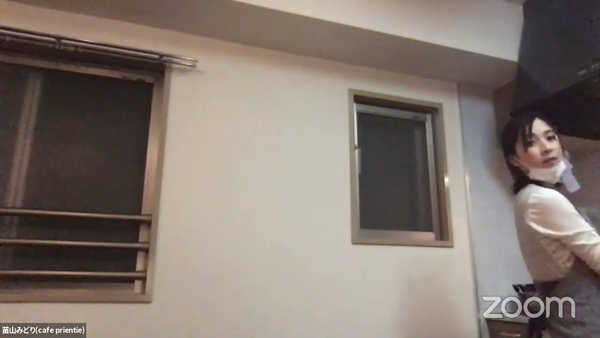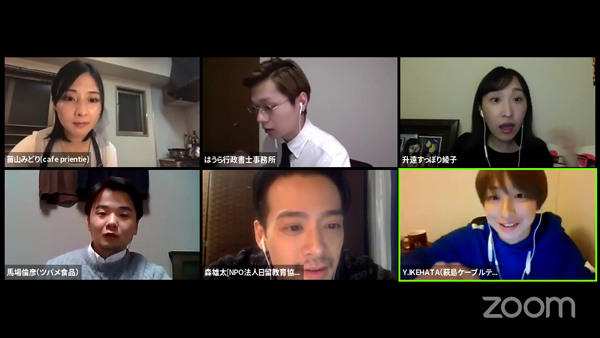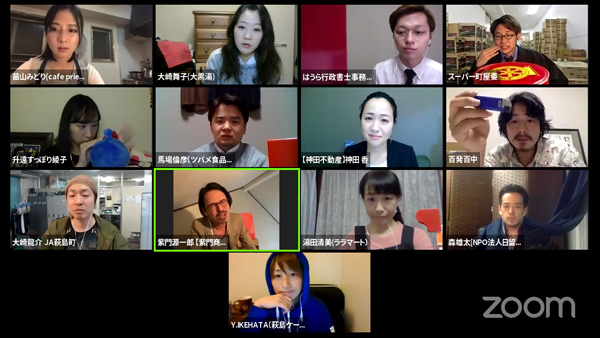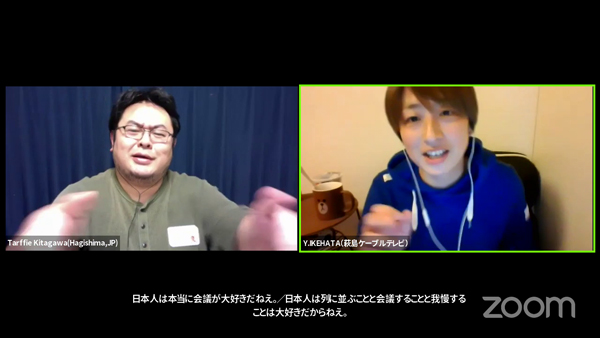



The Council – Online edition
Data
:
Premiere: 2020
Length: 2 hr. 25min.
Acts, Scenes: 1 Act, 8 scenes
Cast: 14 (8 male, 6 female)
The Council – Online edition

Born 1985 in Kagoshima Pref. Playwright, director, actor and producer. In 2008, while a student at Tokyo University, Kitagawa started the Theater Company kamuyyassen (company activities suspended from 2017). His creed it to write sturdy plays with finely structured compositions. In 2012 he became project director of the private sector small theater Oji Shogekijo in Tokyo’s Kita Ward. From 2014 to 2018 he serves as artistic director for the same theater and conducted programs such as theater festivals in tie-ups with the local community. After leaving that post, he became a Board Director and Theater Senior Management Director of Oji Shogekijo’s management company, Satoh Shoji Co., Ltd.
https://www.en-geki.com/




The Council – Online edition
Data
:
Premiere: 2020
Length: 2 hr. 25min.
Acts, Scenes: 1 Act, 8 scenes
Cast: 14 (8 male, 6 female)
Prologue:
The video image of people joining an online conference in Zoom comes up on the divided screen. The owner and chef of a café in the business district of town, Naeyama, is shown making a stew, which is a traditional Tomenian dish. The playwright and director Kitagawa comes on and makes some announcements to the viewers.
Scene One:
Having taken on the role of a civil servant of the Hagishima town hall, Kitajima is chatting with Naeyama as they wait for the other conference members to become online. As a countermeasure in leu of the coronavirus pandemic, the planning conference for the town’s chamber of commerce event, Hagishima Festival, is being held online. The chairman of Festival’s organizing committee, Kanda (a real estate agency owner) comes online and Kitagawa leaves the zoom meeting. Then Mukai (an arcade owner) and Machiya (supermarket owner) comes online, but they soon leave with Kanda temporarily.
Next to come online along with credits giving their names and positions are Mori (an NPO representative in charge giving educational support to the town’s immigrant Tomenian population), Shimon (a trading company president, Haura (an administrative [public] notary), Baba (an employee of a food manufacturing company), Ikehata (an employee of the local cable television station), Masutoh (an owner of a pub), the widow Yunoda (owner of a chain convenience store), Ryusuke Osaki (an employee of the local agricultural cooperative) and his wife Maiko Osaki (manager of a public bath). The perennial enemies Mori and Haura begin an argument, but soon Kanda and the other two who had left temporarily return which leads to the beginning of the meeting.
Scene Two
After Maiko reported in the committee’s last meeting that she had an incident with Tomenian woman who came to her public bath smelling of alcohol, the debate that started in the last meeting about whether to solicit Tomenian volunteers for the Festival continues. As others report about incidents of Tomenian shoplifters at the supermarket and convenience stores, their opinion shifts in the direction of not soliciting Tomenian volunteers, but Mori tries his best to object and convince the others not to exclude the Tomenian community.
Scene Three
The debate shifts to the questions about publicity for the Festival, but here again trouble arises when Maiko says it will be too difficult to have the planned event of opening the public bath to visitors wearing bathing suits. Another argument erupts between Mori, who is in charge of the brochures, and his constant antagonist Haura when it is revealed that only Tomenian language texts have been prepared. Machiya and Ikehata intervene to try to stop the argument.
Shimon, who is charge of the barbeque at the Festival’s main stage, interrupts the argument to say he is leaving. Having learned that Shimon was using the past meetings as an excuse to go to Masutoh’s pub, his wife has just sent him a LINE message saying that she wants a divorce. The meeting is suspended as Kanda goes off with Shimon to arbitrate in the couple’s dispute.
Scene Four
The remaining members makes a daily conversation. Ryusuke, Naeyama and Mori had been classmates at high school, and they talk about how Mori had been friendly with the Tomenians during high school as well. When Haura returns and starts bad-mouthing Mori, Naeyama stops him, saying, “Let’s stop talking badly about people when they aren’t here”. Yunoda finds a tweet on Twitter which claims that the Tomenian school is illegally occupying the park where the festival’s main stage is located. They find out the person who posted the tweet has just made an another tweet in the last ten minutes saying that a lot of the people on the Festival committee are stupid and the meetings aren’t making any progress. Some are saying that it must be a committee insider.
Scene Five
It comes to a vote about whether to solicit Tomenian volunteers for the Festival or not. Ikehata puts forward a motion that they agree to abide with the decision. Voting in favour of soliciting Tomenian volunteers are Mori and Ikehata, while Maiko and Yunoda votes against, and the rest say they will abide by the committee’s decision. Among those who didn’t cast a vote, Naeyama gives her personal opinion that since the Festival is an event for everyone to enjoy together in friendship, if the committee decided to solicit Tomenian volunteers it should be by unanimous decision.
Haura suggests that they give priority to the opinion of the people who feel most strongly about the issue. Yunoda brings up the point about the Tomenian school illegally occupying the park again, and after verifying that the claim is true, Haura presses Mori about it. Angered by Mori’s statement that everyone is potentially prejudice against the Tomenians, Machiya, being a victim of shoplifting by them at his store, casts his vote against soliciting them as volunteers.
Ryusuke reveals that his wife Maiko had been hurt in high school when her Tomenian boyfriend suddenly left to return to Tomenia. The fact is that the attacker of a series of rape crimes committed by a Tomenian 20 years ago had been the older brother of Maiko’s boyfriend at the time. Mori states an ignorant excuse to cover for this matter; “That’s because they have a more open attitude about sex.” This statement further sours the mood of the meeting and leads to another break in the proceedings.
Scene Six
Remaining in the meeting are Yunoda, Maiko and Ikehata. They recollect about their high school days and talks about things like what brought the Osaki couple together. Saying that she wants to talk just between the two of them, Maiko leaves with Yunoda and the two talk by telephone.
When Mori returns, Ikehata suggests to him that because they are dealing with Japanese who place so much importance on maintaining a positive atmosphere in things, it might not be impossible to get the opposition to change their attitude that they don’t need [the Tomenians] to those who are saying that it is OK if they are there.
The other members of the committee return in twos and threes. Baba, whose wife is Tomenian-Japanese, suggests that since the Tomenians are involved in all aspects of their lives and work, wouldn’t it be good to accept the debts they owe to them and to continue to talk together. Ikehata cites a Tomenian saying that is close to “When you find a companion, it’s God’s Will,” that in the literal Tomenian means “Wait for the wave,” or, “The tide has come,” and then adds that it means that sometimes there are things that are only solved when the right time comes.
Scene Seven
Mukai says he has found the person who tweeted about the Tomenian school illegally occupying the park, and the revealed writer, Yunoda, tells her true feelings. They include the fact that rampant shoplifting is causing big losses at her store, that her first cousin was one of the women raped by the Tomenian attacker, and that everyone is just faking the optimistic illusion of ever living in harmony with the Tomenians, and she shouts out that the organizing council should just quit the idea of inviting Tomenian volunteers.
Mukai cites the young Tomenians who have been born and raised in Japan and only speak Japanese, and he argues that, “Even if you don’t like them, as long as there are Tomenians like them living among us who have no place else to go, don’t we have to make and effort to get to know them? If your stance is that you don’t like Tomenians, then you don’t belong on this council.”
The members of the council then decides to have another vote about soliciting Tomenian volunteers for the festival. While the majority vote that if they have to choose Yes or No they are in favor of soliciting for volunteers, Yunoda, Maiko and Naeyama abstain from voting. Yunoda and Maiko agree to abide by the decision of the majority. However, Naeyama holds to her own opinion, saying that, “We would have to bring ourselves down to the Tomenian’s level.” Masutoh objects by saying that, “Isn’t such a statement an offensive denial of the need to try to get along with each other?”
At this point Shimon gets an email from his wife, who he’s in the midst of a cold war, and says that he wants to leave for home. With this the council meeting ends.
Epilogue
Remaining on screen are Ikehata, Masutoh and Naeyama. Masutoh puts out a hand toward Naeyama for a handshake, but she refuses it and leaves. Ikehata says she wants to eat the stew Naeyama made with her, but she refuses that too.
Kitagawa from the town hall appears to verify that the meeting is over. Ikehata and Naeyama leave. On the screen now shows Kitagawa alone. Ikehata reappears, and the two joke in fluent Tomenian about how ‘Japanese’ the council members are (in which the conversation is shown via subtitles).
Related Tags